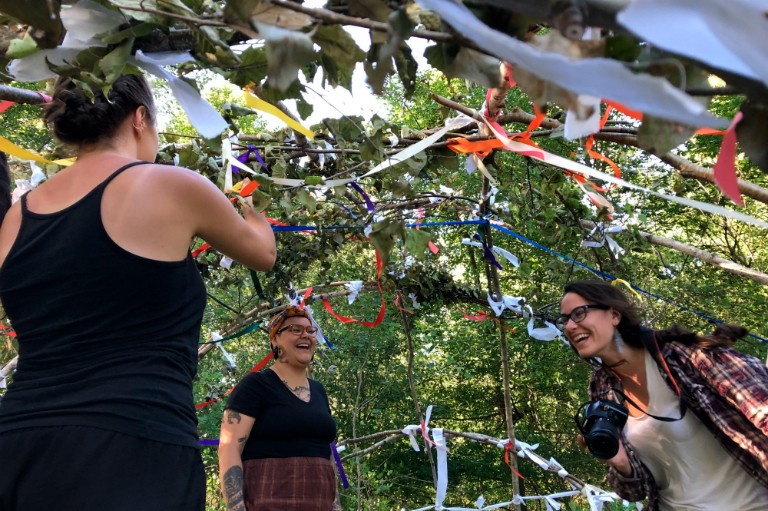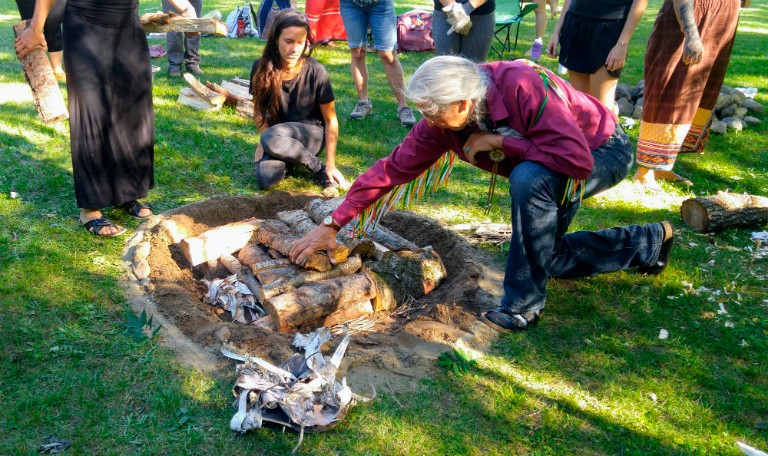Concordia workshop explores how research affects Indigenous communities — and what needs to change

Indigenous peoples have been research subjects since the Europeans first set foot in the Americas. And the impact of that research has not always been positive.
On November 15, Indigenous Directions at Concordia hosted “Indigenous Perspectives on the Ethical Conduct of Research,” a workshop exploring the impacts of being “researched to death” — as one Elder put it — and what needs to change to create more ethical research relationships with Indigenous communities.
The workshop is part of the Pîkiskwêtân Indigenous learning series. The series, whose name means “let’s talk” in Nêhiyawêwin (Cree), is designed to help all Concordians build cultural competency and knowledge to work effectively with Indigenous community members and provide culturally safe services and programs to Indigenous students.
Manon Tremblay, senior director of Indigenous Directions and a nêhiyaw-iskwêw (Plains Cree) from the Muskeg Lake Cree Nation, led the workshop. Prior to her role at Concordia, Tremblay was the director of Indigenous research at the Social Sciences and Humanities Research Council of Canada (SSHRC), where she worked on the engagement initiative that led to the Tri-Council’s strategic plan Setting New Directions to Support Indigenous Research and Research Training in Canada.
Tremblay explains the historical relationship between Indigenous communities and researchers and describes how Indigenous communities would like to see that relationship change going forward.
Can you explain the motivation and need for creating this workshop?
Manon Tremblay (MT): Prior to my position at Concordia, I led an 18-month engagement process for the Tri-Councils+ with First Nations, Métis and Inuit communities across Canada. We listened to thousands of Indigenous people on the subject of research. We heard some common themes emerging on Indigenous peoples’ experience with research.
One of these common themes was “helicopter research.” This is a practice where researchers drop into a community without prior notice or consent. No one knows who they are, what the research is about or how long they are staying. What they do know is that when the researchers leave, the community will likely never see them again and they'll also likely never see the results of the research.

What would Indigenous communities like research to look like going forward?
MT: Indigenous people are tired of research priorities that are mainly driven by the interests of the researcher and don’t address community needs. They would like to engage in more equitable partnerships where research serves the interests of all parties. We want to be active participants in the research process.
We'd like researchers to prepare the ground before they arrive in our communities. To foster long-term mutually beneficial relationships, it’s imperative to engage with community leaders and Elders before the research starts and really listen to the guidance and advice that they have to offer. It’s also important to continue engaging during the research and after the research has concluded.
Another common theme that emerged was the need to involve community members in the research in ways that respect Indigenous ways of knowing. As Indigenous people, we want to know what's happening. Given the chance, we would like to be able to contribute, but in meaningfully, not in a tokenistic or performative way.
We want researchers to take the time to explain what they're doing in layperson’s terms. We want them to take some time to visit schools and talk to the children about the work they do. Who knows? Maybe that will get one child to consider a career in science.
We want researchers who are invested in the community and are interested in a long-term research relationship.
Is there one thing you’d like people to come away with after this workshop?
MT: Researchers need to reflect on what it’s like for Indigenous people to have been the subjects of research for the better part of the last 150 years.
Wherever I went across Canada, I heard the Elders say, “We have been researched to death, and I’ve yet to see the results of that research.” One Elder said, “I've been researched my entire life. I still don't know what all that was about.”
It is also important for researchers to think about how much space they take when they are in one of our communities. Their very presence can be disruptive to the daily life of many people. Their personal and professional needs can be taxing on the community. Our Elders are overburdened with requests for interviews and performative work. It is useful to discuss these issues beforehand with leaders and Elders.
Build cultural competence and knowledge to work effectively with members of the Indigenous community by registering for the Pîkiskwêtân Indigenous learning series at Concordia.




